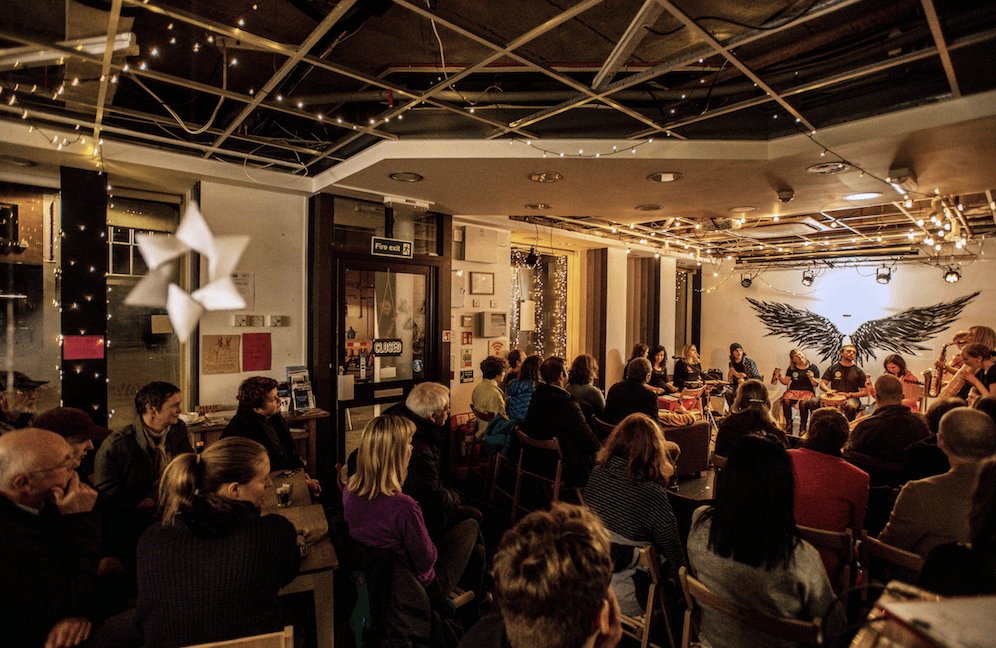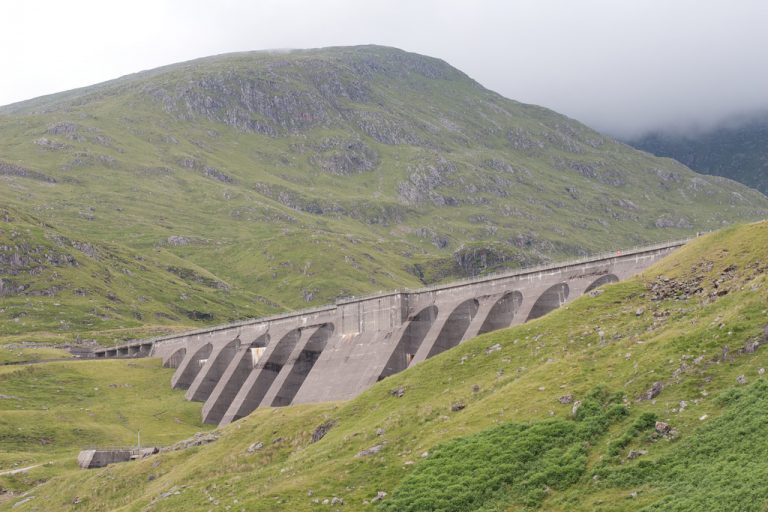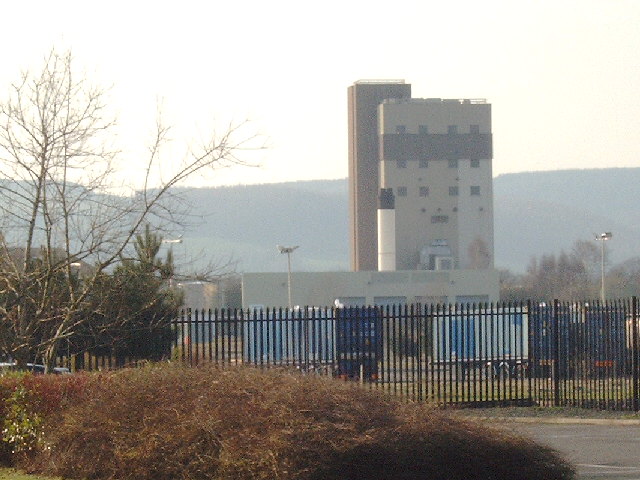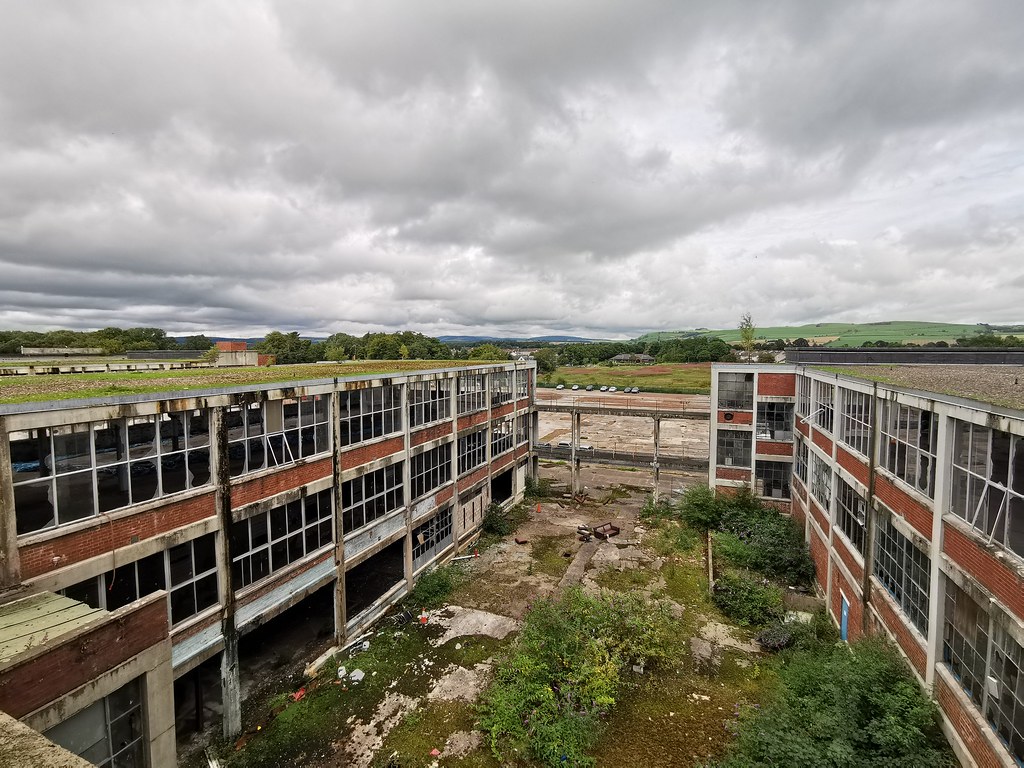The Oil Machine in Dumfries

A sudden burst of clapping from a couple at the back of the café and a ripple of laughter through the audience. This is the first response of the evening and the humour is ironic. It is in response to comments from the panel about the challenge of getting to Dumfries by train. Later the couple who applauded explained their outrage at being at the mercy of the rail company, ScotRail:
“Four times I’ve intended to go from here to Edinburgh, and three times the trains have failed to go! It is just appalling!”
Close to thirty of us are gathered in The Stove Café on the High Street in Dumfries, south west Scotland. Here to watch a screening of The Oil Machine hosted by the Reel to Reel programme run by Katie Anderson of The Stove Network.
Walking down the High Street of Dumfries I found it hard to shake off my feeling that the town has seen better days. Several shopfronts lie empty. The chains are still here – Boots, WH Smiths, Waterstones, Costa and Starbucks – and in between are charity shops, barbers, pubs and cafes. But amongst them is The Stove, in fresh orange and grey paintwork. This is the public face of a remarkable initiative, set up by a network of artists and activists over a decade ago. It combines a thriving café with a programme of public arts all across the region – from Lockerbie in the east to Stranraer in the west – as well as a packed calendar of events in the café itself, including Reel to Reel, Climate Kitchen and Repair Shop. This last group works to reduce personal consumption, and especially reduce the use of plastics whose hydrocarbon origins are explored in The Oil Machine.
The Stove is by no means the only inspiring initiative in this region of Dumfries & Galloway, but it is a potent symbol of what can be done. How individuals and groups acting together can build something that is vital and inspiring. The Network is largely horizontal in its organising, which – from a conversation with one of the team – can make its processes tiring at times, but this means it is constantly alive and rejuvenates itself.

There is this same spirit of vitality in the audience at this evening screening. Here are folks taking steps out of the oil machine. A woman and man who’ve put photovoltaic panels on their home, providing power for the household and solar energy for the electric car. A teacher who is engaging her pupils at the secondary school in questions of climate change. A courageous Just Stop Oil activist eager to recruit others to join her in determined protest. And the organiser of Climate Kitchen at the Café, whose next slew of events will focus on the future of energy.
Here too is my fellow speaker on the question & answer session following the film, Roland Chaplain who lives twenty miles west of the town. He has been engaged in the challenges of climate breakdown since the 1970s and pioneered remarkable initiatives in meteorology driven by public observers, a form of ‘citizen science’.
Roland is coruscating in his criticism of the large corporations that have brought up community led, or publicly owned, renewable energy systems. The Galloway hydro-electric power scheme was established in the 1920s and ran successfully until the Drax Group plc purchased it in 2018. However the corporation effectively purchased it to greenwash their image, for they have been publicly criticised as a historic carbon polluter. Consequently the hydro plant is peripheral to the corporation’s main business focus. There’s talk of Drax manufacturing green hydrogen using power from the scheme that currently goes to waste. Roland believes this would be a true test of their sincerity as a company committed to tackling climate chaos.

Roland talks also of the Blackcraig Windfarm, where the community body that began the scheme has been pushed aside by the new purchasers Temporis Capital, an international finance company. As he points out, perhaps new legislation from the Scottish Government requiring commercial renewable energy companies to ensure that communities have a 10% stake in any scheme will make such a move impossible in the future?
As the conversation unfolds, I’m struck by the sense that our culture became embedded in oil and gas through a myriad of actions (which we attempt to detail in Crude Britannia). Those that came before us – and we ourselves – chose at some particular point, some day, some place, to buy an object wrapped in plastic, to purchase a car, to save up for a central heating system, to plan a holiday that would require a first flight. Slow, slowly, action by action, we stepped into the embrace of the oil machine. Either willingly or seduced – or both – so many in these islands helped build the machine that we are inside.
But now, through a myriad of actions, so many are are stepping out of that machine. Choosing not to buy plastics, gathering the money to pay out for a solar electric system and an electric car, bringing climate issues into what we teach in the classroom, taking direct action against the inaction (or actions) of government and the decisions (or lack of decisions) by corporations.
Individual action can only go so far without collective action. The exasperation at the failings of ScotRail, and the sense of powerlessness of passengers, are a fine illustration of that! The institutions of power, those collections of thousands of individuals in the bodies of the state or corporations, also drove us into the oil machine. It was decisions made by executives and politicians in companies and parties, by civil servants and middle ranking staff in government departments and banks, that moved us relentlessly into hydrocarbon dependency. It is these same institutions of power that have to be pressured into moving out of oil and gas. Pressured by individuals, pressured by civil society groups, and pressured by sections of the state that are finally become committed to breaking with the oil machine.
The following morning walking west out of town on the rain scudded tarmac towards Dalbeattie, my mind is spinning around the questions of individual action and the role of institutions of power.
Here and there, in the more affluent suburbs of Maxwelltown, there are houses with solar water heater panels and photovoltaics. But seemingly all the cars and vans that swish by on the road are powered by petrol. The Stagecoach buses are diesel fuelled. The ScotRail trains are not run on renewable electricity.

At the western fringe of the town, beyond the flooded Cargen valley, beyond the village of Cargenbridge, is the Garroch Business Park. Here beside a disused railway line are the storage tanks of the Certas depot (fuel for nearby petrol stations), and the factories of PETUX (Polymer Extension Technology) and PTS (Plastic Technology Services), humming and active on this wet weekend. These small outfits stand in the lee of the DuPont Teijin chemical works, its stainless steel chimneys and towers rising above the trees by the Dalbeattie Road. All of these units are on land that was once a massive factory owned by Imperial Chemical Industries – ICI.
Dumfries and all of the land north of the Solway Firth were chosen by the Ministry of Supply as an epicenter of weapons manufacturing in the opening years of World War II. Judged to be sufficiently beyond the range of German bombers, factories were built on the fields of grazing with astounding haste. The Drungans dairy farm was compulsory purchased, the plant constructed, and soon 1,350 staff – half of them women – worked round the clock manufacturing acid that went into bomb making. Bold moves by the British state developing its War Economy catapulted the farming communities of Dumfriesshire into the oil machine.

After the War, the Drungans factory was brought from the state by ICI who made it into a manufacturer of specialist plastics. By the 1960s it was producing Propafilm, a packaging material that supplied 60% of the European market for cigarette wrappers and biscuit packets. The plant employed 1,600 workers. In parallel to the ICI works, was a synthetic rubber factory established at Heathhall on the eastern edge of Dumfries, at the site of a former car plant. Here the US corporation Uniroyal (later Interfloor) made the location one of the world’s largest producers of synthetic carpet underlay – part of the barely noticed comforts of life in the oil machine.
But Dumfries’ role in the world of plastics has been in steady decline. Interfloor began closing in 2013, whilst ICI sold Drungans to the US company DuPont in 1998. There were plans to secure jobs with a £20 million investment. A decade on there are clouds over the future of the plant, now owned by DuPont Teijin, as DuPont considers selling its stake.

The light rain continues as I turn from Garroch and Drungans and walk back into the town. Back down the Sustrans track that runs on the disused railway line. Along what is now a cycle path, shrouded with Birch trees, tank cars rumbled, carrying chemicals to and from the ICI plant.
So many changes that have happened in Dumfries and the region around have been determined by outside bodies – from the Ministry of Supply to ICI, from DuPont to Drax and ScotRail. Yet The Stove Network demonstrates the power of collective action, magnifying individual action with paths determined by those that live in Dumfrieshire. It is actions such these, and organisations such as these that can carry us along the path out of the oil machine. But then come the questions of how can initiatives like The Stove be better resourced and financed? How might they be scaled up and have their longevity secured? And how to retain its’ potent spirit whilst it is underpinned?
*
Thanks to Katie Anderson, Roland Chaplain, Flick Monk, Lena Simic, Terry Macalister and Annie Brooker.